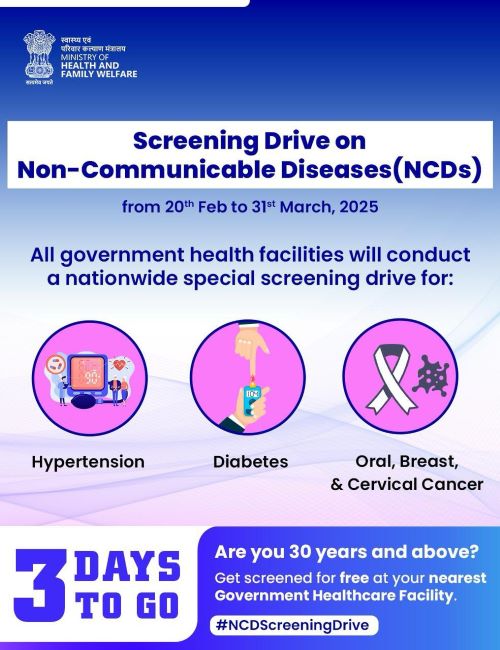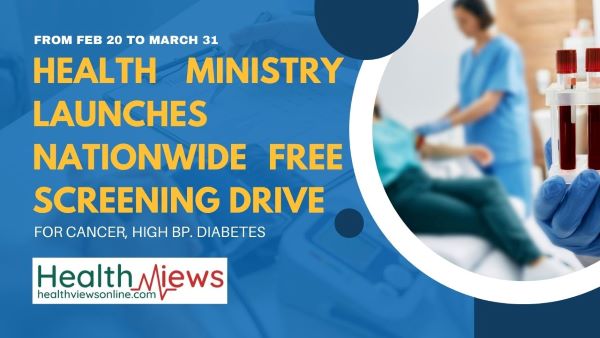The Ministry of Health and Family Welfare (MoHFW) has officially announced a nationwide screening FREE drive aimed at detecting and preventing non-communicable diseases (NCDs) such as high blood pressure, diabetes, and cancer. The program will run from February 20 to March 31, offering free screenings at government healthcare facilities across the country.
Why Is This Nationwide Free Screening Drive Important?
The rising prevalence of hypertension, diabetes, and cancer in India is alarming. According to the Indian Council of Medical Research-National Institute of Nutrition (ICMR-NIN), non-communicable diseases are responsible for 66% of all deaths in the country. Unlike Western nations, where these diseases typically appear later in life, Indians are experiencing them at much younger ages—often during their most productive years (26-59 age group).
What You Need to Know About the Screening Drive
The Health Ministry has urged all individuals aged 30 and above to visit their nearest government healthcare center to get screened for:
- Hypertension (High Blood Pressure)
- Diabetes
- Oral Cancer
- Breast Cancer
- Cervical Cancer
The goal is to detect early symptoms, provide timely intervention, and reduce the long-term burden of these illnesses.

Recognizing the Warning Signs
The Health Ministry has also issued a public advisory on diabetes symptoms that shouldn’t be ignored:
- Blurred vision
- Increased appetite
- Delayed healing of wounds
- Fatigue and weakness
- Constant thirst
- Sudden weight loss
- Frequent urination
Ignoring these signs could lead to severe complications, including kidney failure, heart disease, and nerve damage.
The Rising Burden of Non-Communicable Diseases in India
A report from ICMR-NIN highlights that 56% of India’s disease burden is linked to unhealthy diets. Processed foods, excessive sugar intake, and lack of physical activity contribute significantly to the rise in lifestyle diseases.
- Cardiovascular diseases are now among the leading causes of death in India.
- Diabetes cases are skyrocketing, with millions still undiagnosed.
- Cancer rates, especially oral, breast, and cervical cancer, continue to climb due to late detection and poor awareness.
Also Read: Breast Cancer: Symptoms, Causes, Risk Factors, Diagnosis, Prevention, Facts
The Role of Diet and Exercise
Prime Minister Narendra Modi, during his address at the 38th National Games in Dehradun, emphasized the importance of exercise and a balanced diet. He encouraged citizens to cut down on unhealthy fat and oil intake, suggesting a 10% reduction in daily oil consumption as a small but impactful step towards better health.
What Experts Are Saying
Dr. Ramesh Mehta, a senior cardiologist, stated,
“Early screening is crucial. Most patients with high BP or diabetes don’t even know they have it until it’s too late. Regular screenings can literally save lives.”
Dr. Anjali Gupta, an oncologist, emphasized,
“Breast and cervical cancer cases are increasing among young Indian women. Early detection through routine checkups can prevent complications.”
How to Participate in the Screening Drive
Participation in the screening drive is simple. Just follow these steps:
- Find your nearest government healthcare center (Check MoHFW’s website or visit your local PHC).
- Visit the facility between February 20 and March 31.
- Get your free screening for BP, diabetes, and cancer.
- Follow up with medical professionals for further advice.
Also Read: Introducing a List of Government Health Insurance Schemes in India
FAQs
1. Who can participate in this screening drive?
Anyone aged 30 and above is encouraged to participate. Those with a family history of diabetes, hypertension, or cancer should especially get screened.
2. Is the screening completely free?
Yes, all government healthcare centers will provide free screenings during the campaign period.
3. How long does the screening process take?
Typically, it takes 30 minutes to an hour, depending on the tests being conducted.
4. What should I bring for the screening?
Carry your Aadhaar card, any previous medical records, and a list of current medications, if any.
5. What happens if I am diagnosed with a condition?
If your results indicate a potential health risk, you’ll be referred for further evaluation and treatment at a government hospital or a specialist.
This nationwide initiative by the Health Ministry is a significant step toward tackling India’s growing burden of non-communicable diseases. Early detection saves lives, reduces healthcare costs, and improves quality of life. If you or your loved ones are above 30, don’t wait—get screened today!
Stay informed, stay healthy!
For more updates on health initiatives, follow MoHFW on social media or visit their official website.





